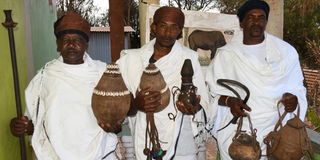Put culture at the centre of development, leaders urged

From left: Mzee Rob Galgallo, Nurr Guyo and Liban Denge showcasing Borana regalia during an interview with the Nation on October6, 2021. Marsabit residents want the county and national governments to create awareness programmes to help seal cultural voids created by greater urbanisation.
For too long, culture and the arts have been subordinated to national development due to conservative attitudes about what they represent.
And now, some residents of Marsabit want the county and national governments to create awareness programmes to help seal cultural voids created by greater urbanisation.
They say culture ought to be at the centre of development by the two levels of government.
Mzee Rob Galgallo, a resident of Saku who hails from the Borana community, decried the continuing erosion of indigenous cultures by Western lifestyles, thus creating a massive disconnect between old and younger generations.
"We call on the government to create more culture awareness programmes to avert the diminishing of our African cultural identities and also to enhance tolerance towards other cultures among the younger generations," Mr Galgallo said.
On verge of vanishing
Speaking to Nation.Africa at his home, he observed that cultures that give Africans unique identities are on the verge of vanishing or being abandoned by younger people in favour of modern lifestyles.
He explained that the promotion of indigenous cultural practices would enhance the ability to be culturally informed by reflecting on their history, attitudes and beliefs about cultures.
Such cultures can also be exported globally and monetised, making creative enterprises and cultural industries strategic drivers for human development.
Similar sentiments were echoed by Nuro Guyo, from the Wayyu community, who said that enhanced promotion of cultural awareness by the government would aid recognition and respect for diverse cultural practices, identities and attitudes among younger generations.
Open-mindedness
It also enhances the open-mindedness and flexibility of their attitudes towards people from other cultures.
Liban Denge, speaking on behalf of young people, held that they should be dissuaded from promoting culturally unsafe practices that diminish, demean or disempower the cultural identity and well-being of others.
For her part, Ms Habiba Roba observed that everyone, regardless of their cultural background, makes decisions through a cultural lens that shapes a person’s view of what is normal or abnormal.
She said that lack of awareness among young people has been the root cause of intolerance and biases against other cultures.




